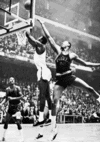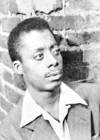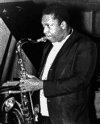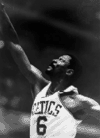
Timeline:
1960-69: Black Power and a Free Africa
| 1960 Jim Stewart and Estelle Axton, a white brother and sister, found Stax Records of Memphis, Tennessee, which comes to define the Southern soul music sound identified with artists such as Sam and Dave, Booker T. and the MGs, and Otis Redding. | ||
| 1960 Cameroon, Togo, Madagascar, Zaire (later Democratic Republic of the Congo), Somalia, Dahomey (later Benin), Niger, Upper Volta (later Burkina Faso), Ivory Coast (later Côte d'Ivoire), Chad, Central African Republic, Congo, Gabon, Senegal, Mali, Nigeria, Tanganyika (later part of Tanzania), and Mauritania gain independence. | ||
| 1960 The sit-in movement is launched at Greensboro, North Carolina, when black college students insist on service at a local segregated lunch counter. | ||
| 1960 Inspired by the sit-in movement, jazz drummer Max Roach composes and records the historic Freedom Now Suite with lyricist Oscar Brown, Jr., and his wife, vocalist Abbey Lincoln. | ||
| 1961 Testing desegregation practices in the South, the Freedom Rides, sponsored by CORE, encounter overwhelming violence, particularly in Alabama, leading to federal intervention. | ||
| 1961 Whitney Young is appointed executive director of the National Urban League. He builds a reputation for his behind-the-scenes work to bridge the gap between white political and business leaders and poor blacks. | ||
 | 1962 Basketball player Wilt Chamberlain becomes the first player to score more than 4,000 points in regular-season National Basketball Association games. | |
| 1962 Sierra Leone, Burundi, Rwanda, and Uganda gain independence. | ||
| 1962 The U.S. Supreme Court rules that the University of Mississippi must admit its first African American student, James Meredith. | ||
 | 1962 The New Yorker magazine publishes a long article by author James Baldwin on aspects of the civil-rights struggle. The article becomes a best-seller in book form as The Fire Next Time. | |
| 1962 South African Nelson Mandela is jailed and sentenced to five years in prison. Two years later he is sentenced to life imprisonment for sabotage, treason, and violent conspiracy. | ||
| 1963 In Birmingham, Alabama, Police Commissioner Eugene "Bull" Connor uses water hoses and dogs against civil rights protesters, many of whom are children, increasing pressure on President John F. Kennedy to act. | ||
| 1963 Medgar Evers, Mississippi field secretary for the NAACP, is shot and killed in an ambush in front of his home, following a historic broadcast on the subject of civil rights by President John F. Kennedy. | ||
| 1963 The Reverend Martin Luther King, Jr., writes "Letter from a Birmingham Jail" to eight clergymen who attacked his role in Birmingham. Widely reprinted, it soon becomes a classic of protest literature. | ||
| 1963 Sidney Poitier wins the Academy Award as best actor for his performance in Lilies of the Field. In 1967 he would star in two films concerning race relations, Guess Who's Coming to Dinner and In the Heat of the Night. | ||
| 1963 Kenya and Zanzibar (part of Tanzania) gain independence. | ||
| 1963 The Organization of African Unity (later African Union) is formed. | ||
| 1963 The civil rights movement reaches a dramatic climax with a massive march on Washington, D.C. Among the themes of the march "for jobs and freedom" was a demand for passage of the Civil Rights Act. In Washington, an interracial audience of more than 200,000 hears Martin Luther King deliver his famous “I Have a Dream” speech. | ||
| c. 1963 Free jazz, an approach to jazz improvisation that emerged during the late 1950s, gains momentum and influence among a wide variety of jazz artists led by Ornette Coleman, Eric Dolphy, Sun Ra, and others. | ||
| 1964 Malcolm X leaves the Nation of Islam, announcing the formation of his own religious organization. He makes the pilgrimage to Mecca, modifying his views on black separatism upon his return. | ||
| 1964 LeRoi Jones's play Dutchman appears off-Broadway and wins critical acclaim. The play exposes the suppressed anger and hostility of American blacks toward the dominant white culture. | ||
| 1964 The bodies of three murdered civil rights workers—two white, one black—are found in Philadelphia, Mississippi. | ||
| 1964 President Lyndon Baines Johnson signs the Civil Rights Act into law, giving federal law enforcement agencies the power to prevent racial discrimination in employment, voting, and the use of public facilities. | ||
| 1964 The Reverend Martin Luther King, Jr., is awarded the Nobel Prize for Peace in Oslo, Norway. | ||
| 1964 Bob Gibson, pitcher for the St. Louis Cardinals, begins an unprecedented streak of seven straight World Series wins by taking Game Five and, on two days' rest, Game Seven. | ||
 | 1964 Jazz saxophonist John Coltrane records his masterpiece, A Love Supreme. | |
| 1964 The 24th Amendment ends the poll tax in federal elections. | ||
| 1964 Malawi and Zambia gain independence. | ||
| 1965 The Voting Rights Act is passed following the Selma-to-Montgomery March, which garnered the nation's attention when marchers were beaten mercilessly by state troopers at the Edmund Pettus Bridge. | ||
| 1965 The Watts area of Los Angeles explodes into violence following the arrest of a young male motorist charged with reckless driving. At the riot's end, 34 are dead, 1,032 injured, and 3,952 arrested. | ||
| 1965 The Gambia gains independence. | ||
| 1966 The Black Panther Party for Self-Defense is founded in Oakland, California, by Huey Newton and Bobby Seale, with the original purpose of protecting residents from acts of police brutality. | ||
| 1966 Charting a new course for the civil rights movement, Stokely Carmichael, chairman of the Southern Christian Leadership Conference, chooses to use the phrase "black power" at a rally during the James Meredith March that summer in Mississippi. | ||
 | 1966 Bill Russell, one of the greatest defensive centres in the history of basketball, becomes the first black coach of a major professional sports team (the Boston Celtics) in the United States. | |
| 1966 Edward Brooke of Massachusetts becomes the first African American to be popularly elected to the U.S. Senate. | ||
| 1966 The African American holiday of Kwanzaa, patterned after various African harvest festivals, is created by Maulana Karenga, a black-studies professor at California State University at Long Beach. | ||
| 1966 Botswana and Lesotho gain independence. | ||
| 1967 After being denied his seat in the Georgia state legislature (although duly elected) for opposing U.S. involvement in the Vietnam War, civil rights activist Julian Bond is finally sworn in on January 9. | ||
| 1967 Singer Aretha Franklin, the "Queen of Soul," releases a series of hits including "I Never Loved a Man," "Baby, I Love You," and "Respect," the last of which becomes something of an anthem for the civil rights movement. | ||
| 1967 Heavyweight champion Muhammad Ali refuses to submit to induction into the armed forces. Convicted of violating the Selective Service Act, Ali is barred from the ring and stripped of his title. | ||
| 1967 Blues and rock guitarist Jimi Hendrix makes his spectacular debut at the Monterey International Pop Festival, following the successful release of his first album, Are You Experienced? | ||
| 1967 Huey P. Newton, cofounder of the Black Panther Party, is convicted on a charge of manslaughter in the death of an Oakland policeman, leading to the rapid expansion of the party nationwide. | ||
| 1967 Thurgood Marshall, who as a lawyer argued Brown v. Board of Education of Topeka, becomes the first African American U.S. Supreme Court justice. | ||
| 1967 Carl Stokes (Cleveland, Ohio) and Richard Hatcher (Gary, Indiana) are elected the first African American mayors of major U.S. cities. | ||
| 1968 Eldridge Cleaver, the Black Panther Party's minister of information, publishes the autobiographical Soul on Ice. | ||
 | 1968 On April 4 the Reverend Martin Luther King, Jr., is assassinated in Memphis, Tennessee. The assassination is followed by a week of rioting in at least 125 cities across the nation, including Washington, D.C. | |
| 1968 Following the assassination of Martin Luther King, Jr., Ralph Abernathy succeeds him as president of the Southern Christian Leadership Conference, carrying out the SCLC's Poor People's Campaign. | ||
| 1968 Bob Beamon sets the world record in the long jump at the 1968 Olympic Games in Mexico City, surpassing the previous mark by 21 ¾ inches. | ||
| 1968 After winning the gold medal, sprinter Tommie Smith and teammate John Carlos give a black-power salute during the awards ceremony, leading to their suspension by the U.S. Olympic Committee. | ||
| 1968 Actor James Earl Jones wins acclaim and a Tony award for his portrayal of legendary boxer Jack Johnson in Howard Sackler's play The Great White Hope and later stars in the film version (1970). | ||
| 1968 Amiri Baraka (formerly LeRoi Jones) and Larry Neal publish Black Fire: An Anthology of Afro-American Writing in the spirit of the black aesthetic movement, which sought to create a populist art form to promote black nationalism. | ||
| 1968 Shirley Chisholm becomes the first black American woman to be elected to the U.S. Congress, defeating civil-rights leader James Farmer. | ||
| 1968 Swaziland and Equatorial Guinea gain independence. | ||
| 1969 Black Panther Party cofounder Bobby Seale is ordered bound and gagged by the judge after Seale protests that he was being denied his constitutional right to counsel during his trial for conspiracy to incite rioting at the Democratic National Convention in Chicago the previous year. | ||

| Copyright © 2005 Encyclopædia Britannica, Inc. |